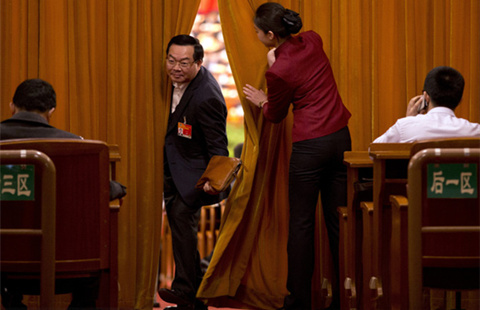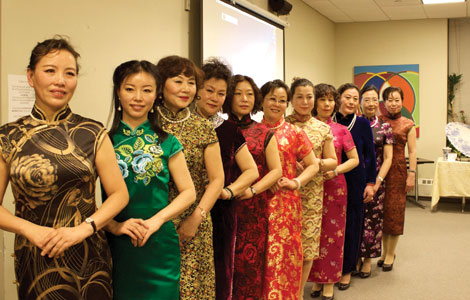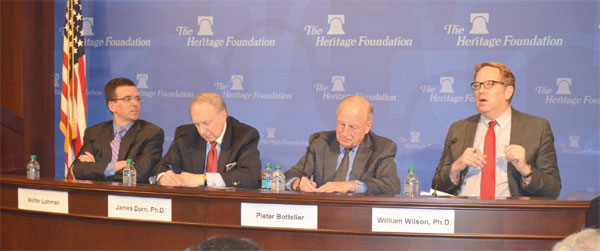Global yuan will 'benefit' dollar
Updated: 2015-03-12 10:48
By Hua Shengdun in Washington(China Daily USA)
|
||||||||
The Chinese currency's internationalization would not be a rival but a bonus to the US dollar, as China's international payment system is said to be ready to launch late this year, according to an expert on China-US business and economics.
"I think it would be a good thing and probably help our fiscal picture across the board if we lose our privilege of being the sole reserve currency," said Walter Lohman, director of the Asian Studies Center of the Davis Institute for National Security and Foreign Policy at The Heritage Foundation, on Wednesday in Washington.
Officially launched as early as September or October, the China International Payment System (CIPS) for the yuan's cross-broader transactions would put it on a "more even footing with other major global currencies like the US dollar" by using the same messaging format, according to Reuters.
|
From left: Walter Lohman, director of Asian Studies Center at the Heritage Foundation; James Dorn, vice president for Monetary Studies and senior fellow at the Cato Institute; Pieter Bottelier, senior adjunct professor of China Studies at the Johns Hopkins School of Advanced International Studies; and William Wilson, senior research fellow of Asian Studies Center at the Heritage Foundation, take part in a panel discussion on China's economic development at the Heritage Foundation on Wednesday in Washington. Sheng Yang / For China Daily |
The system will detach one of the "biggest hurdles" to the internationalization of the yuan, AKA the renminbi (RMB), and "should greatly increase global usage of the Chinese currency by cutting transaction costs and processing times", the report said.
A former senior vice-president and executive director of the US-ASEAN Business Council, Lohman said it's not a fight against the US dollar, and it often leads to a mess when some "try to turn economic issues into geopolitical issues".
"You can't think about it in political terms and geopolitical terms," said Lohman, adjunct professor of American foreign policy interests in Southeast Asia at Georgetown University. "The Chinese currency 'competing' with the US currency is not a football game when one currency wins, another is going to lose."
Daniel McDowell, assistant professor of political science at the Maxwell School of Syracuse University, also said the maturation of the yuan should be viewed as a positive development for the US economy.
"Americans should not view the yuan's rise as a threat to US economic might; rather, it should be understood as an opportunity that will pave the way for a more balanced relationship between the world's two economic superpowers," McDowell said in an earlier report.
US lawmakers have been calling for the yuan to appreciate since 2003, arguing that the currency's artificial weakness costs American jobs and contributes to the US' large trade deficit with China, he added.
McDowell said the global monetary system in the coming decade is not a period of "wrenching transition where the global economy ditches the dollar for the yuan, leaving the American economy in crisis and American economic power in tatters", but one where "the Chinese currency will assume its rightful place in the hierarchy of global currencies - among the euro, yen, pound and others - but still be below the dollar for many years to come".
Pieter Bottelier, senior adjunct professor of China Studies at the Johns Hopkins School of Advanced International Studies and senior advisor to the Conference Board on China, said the CIPS is fundamental for RMB internationalization.
"I think it's terribly important," he said. "It is quite an infrastructure that China is building to make the renminbi more useful internationally."
James Dorn, vice-president for monetary studies and senior fellow at the Cato Institute, called it a "smart move" for China to pursue a gradual adjustment, which has "worked fairly well since 1978".
"This is another indication of the internationalization of that currency and the movement towards a more open capital market, which are very constructive and important steps," Dorn said. "And Hong Kong has been very cooperative in this effort."
Sheng Yang in Washington contributed to this story.
(China Daily USA 03/12/2015 page2)

 Christie's to auction landmark Chinese collection
Christie's to auction landmark Chinese collection
 Chinese manufacturers keeping Apple Watch ticking
Chinese manufacturers keeping Apple Watch ticking
 Hutong culture captured on porcelain plates
Hutong culture captured on porcelain plates
 Foreigners at the 'two sessions' over the years
Foreigners at the 'two sessions' over the years
 Top 10 most valuable airlines brands in the world
Top 10 most valuable airlines brands in the world
 Qipao beauty in Chinese oil paintings
Qipao beauty in Chinese oil paintings
 Daily snapshots of 'two sessions' - March 10
Daily snapshots of 'two sessions' - March 10
 Scroll revives cheongsam beauty in New York
Scroll revives cheongsam beauty in New York
Most Viewed
Editor's Picks

|

|

|

|

|

|
Today's Top News
De Blasio pressed on Lunar New Year
Domestic jet 'to make maiden flight later this year': official
Shambaugh China essay rebuffed
Arkansas U. to expand China ties
CNR, CSR merger passes overseas antitrust scrutiny
Official urges Dalai Lama to forsake evil ways
Taiwan welcome to join WWII commemorations: Spokesperson
Two University of Oklahoma students expelled over racist video
US Weekly

|

|








